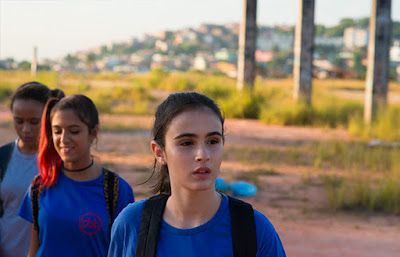Double bill of Anita Rocha da Silveira’s features:
Kill Me Please (2015, Brazil/Argentina)
Medusa (2021, Brazil)
In Kill Me Please, a series of mysterious murders in Barra da Tijuca, a neighbourhood in the West zone of Rio de Janeiro, grab the attention of a few young girls who are curious about the murders and victim’s identities. However, 15 year old Bia (Valentina Herszage) ends up being more than just curious and digs deeper into the victim’s lives, causing her perception of reality to be altered.
Anita Rocha da Silveira’s extremely sharp debut film is a commentary on the new spaces created in Rio especially in time for the 2016 Olympics, such as the high-rise towers and housing blocks. Even though the film is set in Rio, there isn’t a beach in sight. The absence of a beach coupled with the focus on Rio’s new concrete jungle allows the director a vibrant platform to neatly mesh two genres, coming of age plus a horror genre with a splash of red. The end result is a film that depicts a varied contemporary side of Brazil, one where alienation and isolation complicates emotions related to sex and death.
Anita Rocha da Silveira’s second feature Medusa expands the canvas of exploring contemporary Brazilian society with another colourful mix of genres. There are attackers and victims in Medusa but this time, a group of young girls are the attackers. In the film, a group of eight girls wear a mask and hunt at night to beat up young women that are committing sin.
The girl attackers are violent evangelists who demand that their female victim give up their sinful ways and come over to Jesus. The girls belong to a church group and inspired by their minister’s words use fear and violence to spread the message of love and peace. The ironic nature of their ways is fully intended as is evident by the film’s usage of satire to depict the girl’s lives. The main character Mari (Mari Oliveira, acted in Kill me Please) slowly starts to question her evangelist mission and struggles to keep her awakened feelings and desires in check.
The girl attackers are just one arm of the church while the other arm is led by a group of men (referred to as ‘The Watchmen’) who train military style and beat up sinners. The Watchmen are like a fascist group (think Elite Squad) without weapons and use their fists to enforce the word of God.
Like her previous feature, Anita Rocha da Silveira meshes up different genres with touches of horror, satire and a commentary on right-wing politics and religious fanaticism. The title of Medusa clearly touches upon the Greek myth but as per her Cannes interview, Silveira mentions that the film narrows in on Medusa’s scream:
Screams are indeed heard in the film on many occasions, notably in the ending. The screams coupled with usage of a synthwave music soundtrack reminds of John Carpenter’s films. There were many sequences in the film where the soundtrack felt like straight out of Carpenter’s Christine.
The film’s splashy colour evokes Dario Argento while the neon-lit evangelist church scenes reminded me of Gabriel Mascaro’s Divine Love (2019) but the underlying message in the film is dark and points to a radicalization of society and individuals. In the same Cannes interview, Silveira mentions the real life incidents that led to the film’s creation:
"Then I was also struck by reading news articles about girls ganging up to beat up another girl. There were a lot of these episodes happening in Brazil, and also in Argentina and Chile."
Anita Rocha da Silveira may only have two feature films to her name but both films ooze with creativity in depicting Brazilian society. I cannot wait her for next feature.

